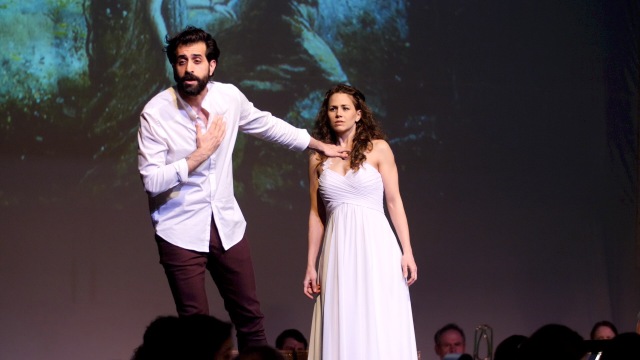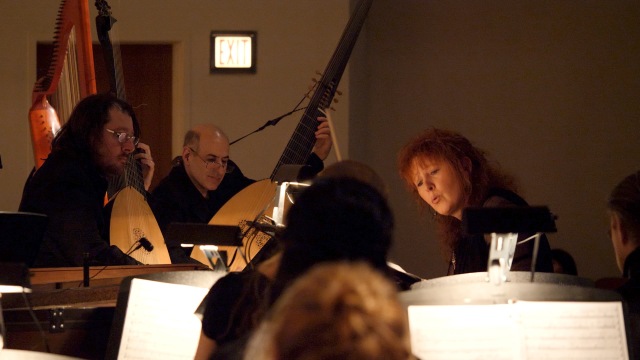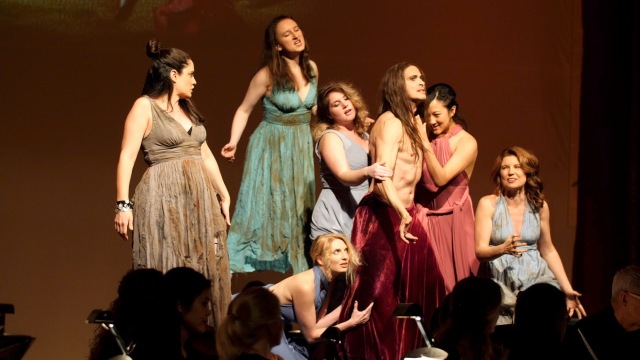Apollo’s Fire
St. Raphael Catholic Church
Bay Village, OH
April 18, 2018
Monteverdi: L’Orfeo
Karim Sulayman, Orfeo
Erica Schuller, Euridice & La Musica
Amanda Powell, Messaggera & Proserpina
Amanda Crider, Speranza
Mischa Bouvier, Plutone
Jonathan Woody, Caronte
Carlos Fittante, dancer
Apollo’s Singers
Jeannette Sorrell, conductor & harpsichord
Sophie Daneman, stage director
In the final concert of their 2017-18 season, Apollo’s Fire (belatedly) celebrated the 450th anniversary of Monteverdi’s birth with an ambitious presentation of his epochal opera, L’Orfeo. Three performances were given locally, with audiences further afield having the opportunity to see it during AF’s tour dates in Ann Arbor, Berkeley, and Sonoma. Considered the first great opera of the Western canon, L’Orfeo (dating from 1607) was the product of a Florentine movement to resurrect ancient Greek drama which almost surely included singing, and thereby set in motion the birth of opera. With The Cleveland Orchestra’s upcoming performances of Tristan und Isolde, Clevelanders thus are afforded the chance to experience two of the most groundbreaking operas within the space of a week.

I caught the Wednesday performance in Bay Village which, due to the touring schedule, reduced the already rather minimalist staging forces – although in a work where the focal point is the music, this was hardly a detriment. A lone projection screen displayed relevant imagery along with translations in real time – while abbreviated on screen, the thick program books provided one with the complete libretto in both Italian and English. In a nod towards the Greeks, the opera was constructed in five acts preceded by a prologue. Matters opened with a boisterous toccata likely not of Monteverdi’s own device, but a piece meant to announce the presence of the Duke of Mantua who was in attendance at the opera’s premiere. Taking advantage of the spacious sanctuary, the brass entered from the back to dramatic effect and set the stage for La Musica’s heartfelt monologue, the first of Erica Schuller’s two major roles.
Act I was centered on the joyous wedding of Orfeo and Euridice (Karim Sulayman and Schuller respectively) and a duet between the couple was particularly affecting. As with Greek tragedy, the chorus played a central role with Apollo’s Singers very finely serving as nymphs and shepherds to add to the festive atmosphere. Three shepherds were given solo roles, lighter, more one-dimensional foils to the more imposing Orfeo. The bliss was broken in the subsequent act with the foreboding Ahi caso acerbo given from offstage by the excellent Amanda Powell as Messaggera, delivering news of Euridice’s untimely death. One could feel a palpable sense of tragedy in Orfeo’s Tu se’morta, grounded in the deep resonance of the pair of theorbos, played by John Lenti and William Simms. Sulayman was magnificently expressive, and it’s hard to envision a more convincing Orfeo. The once jubilant chorus echoed the pathos, and the three shepherds closed the act in a trio of intricately interlocking lines.

The two subsequent acts took were set in the Greek underworld of Hades, as announced by a brass choir plagued by some fitful intonation in spite of the generally very high level of instrumental playing. In the role of Speranza, Amanda Crider offered her namesake hope to a despondent Orfeo, only to contend with an admonishing Caronte, given by a stentorian Jonathan Woody. Ensembles of strings and brass were dispersed throughout the hall, again making creative and effective use of the acoustic space. Orfeo’s (futile) attempt to persuade Caronte through song was particularly striking in its dizzying melismas often pitted against the organ, the latter played by Harvard musicologist Thomas Forrest Kelly. Kelly, who’s book First Nights will be familiar to any college music appreciation student, was also on hand to give an informative and entertaining preconcert lecture.
In Act IV, Powell assumed the role of Proserpina, draped in black (as was the chorus, now embodying the infernal spirits) and addressed Plutone on Orfeo’s behalf. Mischa Bouvier’s booming bass was well-suited to the role of Plutone, who in spite of his severity gave in and allowed Orfeo to reunite with Euridice on the condition that he refrained from glancing back to see if she was indeed following him out of the underworld. Not without human flaw, Orfeo inevitably gave in to temptation – we heard Euridice’s doleful voice one final time and their unhappy fate was irrevocably sealed. While this might seem like far-fetched deus ex machina to modern audiences, I was nonetheless struck how convincingly it was portrayed.
The conclusion of the work has long been fraught with controversy as there are two extant versions of the libretto, both dated 1607 but with markedly different endings. Monteverdi only supplied music for one incarnation of the text and thus the alternate ending is generally overlooked in performance; Apollo’s Fire ambitiously addressed the issue by commissioning principal cellist René Schiffer to set the alternate text to music. Comprising roughly the latter half of Act V, the transition was remarkably seamless as Schiffer preserved Monteverdi’s style with painstaking fidelity. Matters in this ending were a much darker affair, however – instead of ascending to the heavens with Apollo, Orfeo is mocked and attacked during a vigorous moresca by a chorus of Bacchanti (i.e. subjects of Bacchus), enraged at his scorning of women and celebrating in his agony. This gave way to a somber coda, suggesting Orfeo’s reunion with Euridice in Hades.
Jeannette Sorrell conducted with authority from the harpsichord, drawing a detailed, well-balanced, and inimitably Baroque sound from her very talented band of instrumentalists. A strong vocal cast in tandem with stellar orchestral playing and effective stage presentation made for a major achievement.

